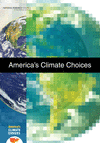*********************************EXCERPTS*******************************************
The National Research Council released the final report in the America's Climate Choices series on May 12, 2011. The public was invited to participate in a special event later that day -- A Conversation on America's Climate Choices, followed by a question-and-answer period and a reception.
Climate Central's Heidi Cullen hosted the conversation with several members of the report's authoring committee, including the Chair of the committee, Al Carnesale, University of California Los Angeles, and the Vice Chair, Bill Chameides, Duke University.
Other participants included:
Marilyn Brown, Georgia Institute of Technology
Donald Boesch, University of Maryland
Thomas Dietz, Michigan State University
Jim Geringer, Environmental Systems Research Institute
Philip R. Sharp, Resources for the Future
Robert Socolow, Princeton University
America's Climate Choices Final Report
 |
May 12: The National Research Council has released the final report of America's Climate Choices. The report is available now through the National Academies Press. It includes a CD of the four panel reports of the America's Climate Choices series as well as materials based on those reports.
Several members of the report's authoring committee discussed will discuss the findings in A Conversation on America's Climate Choices on May 12 (see details below).
The report finds that the significant risks that climate change poses to human society and the environment provide a strong motivation to move ahead with substantial response efforts. Current efforts of local, state, and private sector actors are important, but not likely to yield progress comparable to what could be achieved with the addition of strong federal policies that establish coherent national goals and incentives, and that promote strong U.S. engagement in international-level response efforts. The inherent complexities and uncertainties of climate change are best met by applying an iterative risk management framework and making efforts to: significantly reduce greenhouse gas emissions; prepare for adapting to impacts; invest in scientific research, technology development, and information systems; and facilitate engagement between scientific and technical experts and the many types of stakeholders making America's climate choices.
Press Release
Report in Brief (pdf)
Key findings from the report (pdf)
If your organization has an important forum or event where you'd like to hear more about the America's Climate Choices studies from the reports' authors, please contact Nancy Huddleston at 202-334-1260.
For media inquiries, email the National Academies' Office of News and Public Information at news@nas.edu or call 202-334-2138.
 Advancing the Science of Climate Change |
 Limiting the Magnitude of Climate Change |
 Adapting to the Impacts of Climate Change |
 Informing an Effective Response to Climate Change |